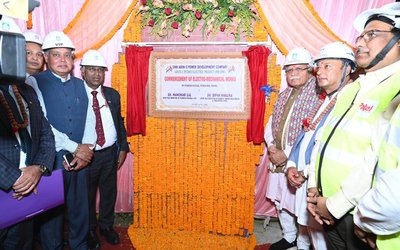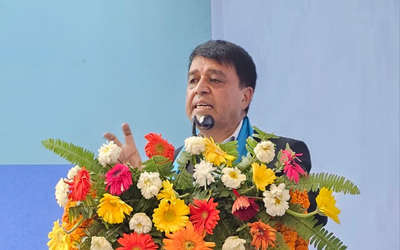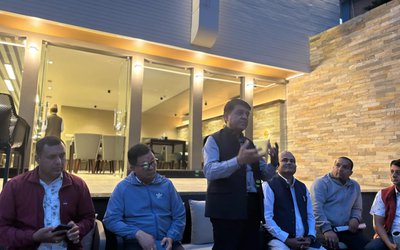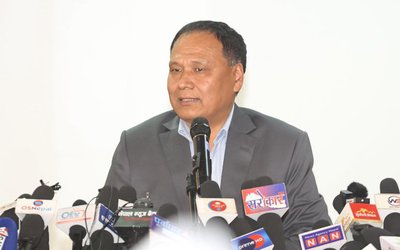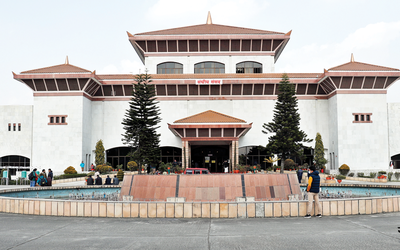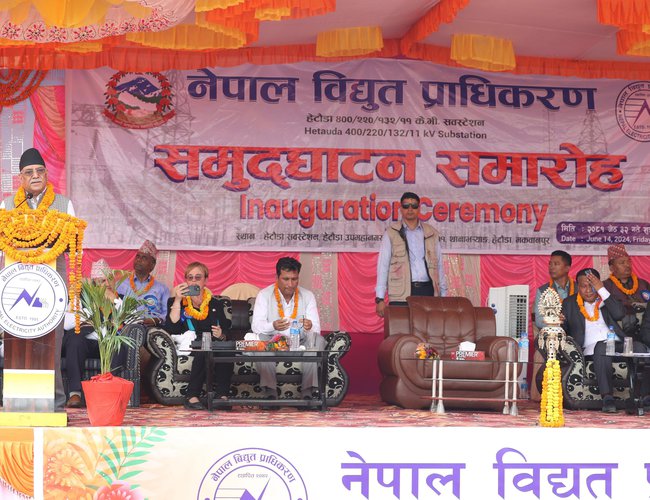
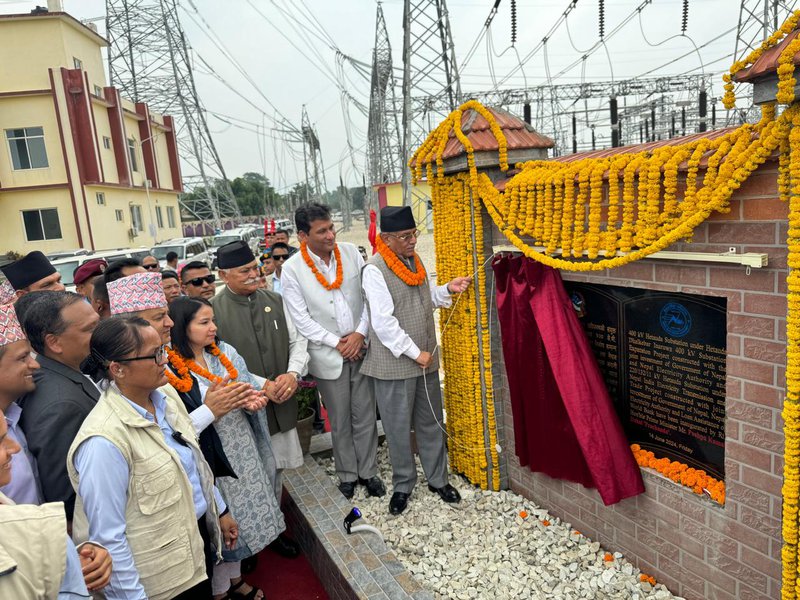
Prime Minister Pushpa Kamal Dahal 'Prachanda' inaugurated Nepal's third largest 400-220-132-11 KV Hetaunda substation.
400 kV Hetaunda substation has been inaugurated in Hetaunda sub-metropolitan city of Makwanpur-11 Thanabhayang for the strengthening and expansion of electricity transmission and distribution system within the country.
In the opening program, Prime Minister Prachanda said that there will soon be a tripartite agreement between the bodies involved in the electricity trade of the three countries to export about 40 megawatts of surplus electricity consumed in Nepal to Bangladesh during the rainy season, and then Nepal's electricity export to Bangladesh will begin. He mentioned that the day Bangladesh electricity export starts will be more important for Nepal's energy development and electricity market expansion.
He said, 'A few days ago, during the meeting during the swearing-in ceremony of his counterpart Honorable Mr. Narendra Modiji, I discussed important issues such as more strongly implementing the bilateral agreements made in the past, border issues, implementation of the Panjeshwar hydropower project, trade and transportation, and from this, long-term electricity trade between the two countries. I believe that important achievements will be achieved in the implementation of the agreement.'
He urged everyone not to understand that they are exporting electricity to India without wanting to consume it within the country. While mentioning that there is still a lack of infrastructure to increase consumption within the country, the Prime Minister said that it is necessary to improve and expand the infrastructure and export electricity that is more saved by consumption.
He instructed the Ministry of Energy and the Nepal Electricity Authority to work with high priority to increase not only the access to electricity, but also to increase the consumption of electricity internally, paying special attention to provide sufficient, reliable, quality and safe electricity service.
He said, "I have received information that there is an obstruction in the construction of the 400 kV transmission line connecting Hetaunda substation to Dhalkebar substation for the past 6-7 years.
“I request the local people to be a tool rather than a hindrance in the construction of such a strategically important transmission line. I also direct the concerned parties to complete the rest of the work immediately by addressing the legitimate demands raised by the local community. Also, I request the relevant agencies including the local government and administration to provide necessary support and facilitation in the work of development.
The Prime Minister mentioned that in the situation where the negative comment that 'nothing has happened in the country, nothing will happen' has started to gain ground, the completion of construction of such large-scale infrastructures has not only communicated hope but has dulled such false comments and discussions with facts and figures.
In the program, Minister of Energy, Water Resources and Irrigation Shakti Bahadur Basnet said that the work has been progressed with the plan to increase the electricity consumption capacity in the country and export the saved electricity and become self-sufficient in energy. Minister Basnet mentioned that in order to solve the problem of the right of way in the construction of the transmission line, a legal arrangement is going to be made to provide shares to the affected people, just like in the hydroelectric project.
In addition, Basnet mentioned that work is being done to address the issue of allocation of land under right-of-way in a policy manner.
Chief Minister of Bagmati Province, Shalikram Jamkattel, Federal MPs of Makwanpur, Deepak Bahadur Singh and Mahesh Bartola stressed that development projects should be taken forward by addressing the legitimate demands of the locals.
Kulman Ghising, managing director of the authority, said that in the past 7-8 years, Tulan has made a qualitative leap in the field of electricity generation, transmission and distribution. Mentioning that the amendment to the Land Acquisition Act through an ordinance has made the problem of land acquisition more complicated in the construction of transmission lines, he requested special attention to be given to the amended provision when making a law by the Parliament.
The Deputy Managing Director of the Authority's Transmission Line Directorate, Dalgayu Kumar Shrestha, said that with the completion of the construction of the Hetaunda substation, the infrastructure structure capable of supplying about 4,000 megawatts of electricity has been prepared.
He mentioned that after the construction of Hetaunda-Dhalkebar-Inruwa 400 KV transmission line project is completed, 4000 megawatts of electricity can be transmitted from Dhalkebar east to west, so the internal electricity supply will be strengthened and the electricity trade with India will expand further.
Shukar Devkota, the head of the project, said that the Hetaunda substation has been built in such a way that it can be further expanded in the future as per the need.
The 400 KV double circuit transmission line to be built from Ratmate in Nuwakot by the American aid project Millennium Challenge Corporation (MCC) will be connected to Hetaunda substation. For this, the necessary infrastructure has been constructed at Hetaunda substation.
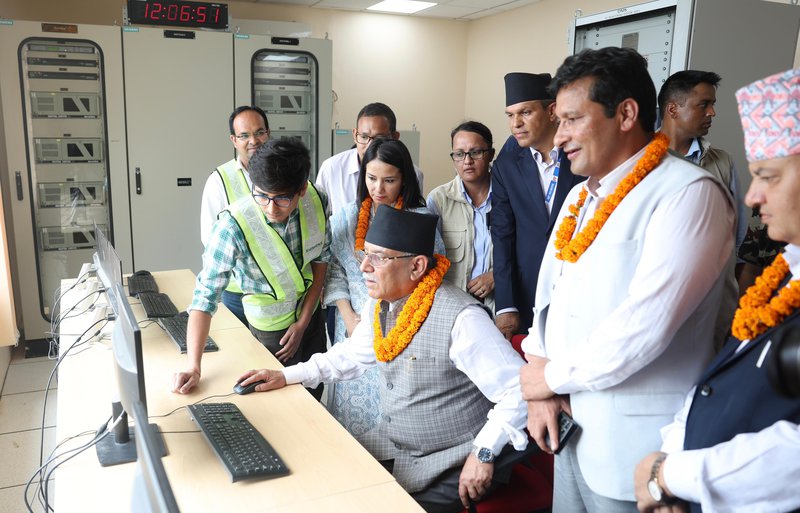
Hetandaida, Dhalkebar Inruva 400 KV under the National Electricity Development Decade Program with the joint investment of the government and the authority. Substation expansion project was started. Construction of all three substations under the project has been completed.
In December 2018, the contract was awarded for the construction of Hetauda 400 KV substation. A contract agreement was signed in December 2018 for the construction of 220-132-11 KV Hetouda substation, which was built by the Nepal India Electricity Transmission and Trade Project with the investment of the government and the authority and the concessional loan of the World Bank. The estimated cost of 400, 220 and 132 KV Hetaunda substations is three billion rupees.
Construction was affected by the global spread of the corona epidemic and the restrictions imposed for its control and prevention. Due to the corona epidemic, the various equipment and technicians to connect the substation reached the project site at the predetermined time and there was some delay in the construction of the project due to other reasons.
- KOICA Concludes Integrated Rural Development Project Worth 4.7 Million USD
- Apr 25, 2025
- Budget session Of Federal Parliament Begins Today
- Apr 25, 2025
- 10th Memorial Day Of Gorkha Earthquake
- Apr 25, 2025
- Kathmandu's Maximum Temperature Likely To Dip From Sunday
- Apr 25, 2025
- Budget Session Of Federal Parliament Commencing On Friday
- Apr 24, 2025
